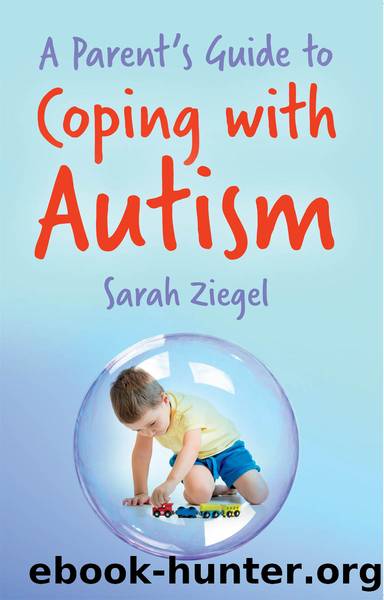Parent's Guide to Coping with Autism by Sarah Ziegel

Author:Sarah Ziegel
Language: eng
Format: epub
ISBN: 9780719820489
Publisher: Robert Hale
5
HOW TO GET HELP AND SUPPORT
The Need for Support
IF YOU ARE FORTUNATE, your immediate family, such as your parents and siblings, will rally round to be with you and try to understand what you are going through, and what this diagnosis means for you and for your childâs future. To begin with, you will probably need this support. In fact, it is almost more important in the first few weeks to establish a source of emotional support than to sort out the practicalities of how you are going to look after your child. After all, before diagnosis you will probably have been caring for your child without outside assistance and, although it may have become increasingly a strain to look after your child, nothing in effect will have changed overnight. It is true that your emotions on hearing your childâs diagnosis will probably go through an enormous change, but your childâs behaviour will be much as it was before you knew the diagnosis. Therefore, you may need a lot of emotional support to get you through the first few weeks or months. Hopefully, your partner will be involved in all your future decisions in caring for your child and the two of you will support each other.
But not all relatives are supportive. You may find that you need a lot of patience when trying to explain how your child behaves and why. If you are going through a grieving process yourself, you may find it hard to be patient with relatives who do not (or cannot) understand what you are trying to tell them. Some may think it is all just a phase your child will grow out of with âbetter parentingâ and that you are making excuses for your child or your own parenting style. Some people are so wrapped up in their own lives that they are unable to spare time for those who need it, even if they are members of their own family. At a time when you feel you have âlostâ your child, you may also âloseâ the closeness with your own family. Autism seems to cause a ripple effect in this way and this can have far-reaching consequences.
So, what do you do if you have family who are not supportive or who are living in another part of the country far from you? What do you do if you are a single Mum or Dad without a significant relative or friend on hand? You will quickly need to find someone who can really help you through the initial emotions after your child has been diagnosed.
Friendship
If your family is unable to provide the love and support you need at this time, you will need the support of your close friends. It is a cliché, but one that is true: at times like these, you really find out who your true friends are. You may be surprised by who steps into the role of âtrue friendâ and who you lose along the way. Having a child with a disability really does change the dynamics of friendship and family.
Download
This site does not store any files on its server. We only index and link to content provided by other sites. Please contact the content providers to delete copyright contents if any and email us, we'll remove relevant links or contents immediately.
Asperger's and Girls by unknow(481)
The Everything Parent's Guide to Children with Executive Functioning Disorder: Strategies to help your child achieve the time-management skills, focus, ... to succeed in school and life (Everything®) by Rebecca Branstetter(403)
Parent's Guide to Coping with Autism by Sarah Ziegel(373)
Autism After the Pandemic by James Ball(342)
Quirky Kids by Perri Klass(289)
Parenting While Working from Home by Karissa Tunis(263)
the Dyslexia Workbook for Adults: Practical Tools to Improve Executive Functioning, Boost Literacy Skills, and Develop Your Unique Strengths by Reid Dr Gavin(235)
